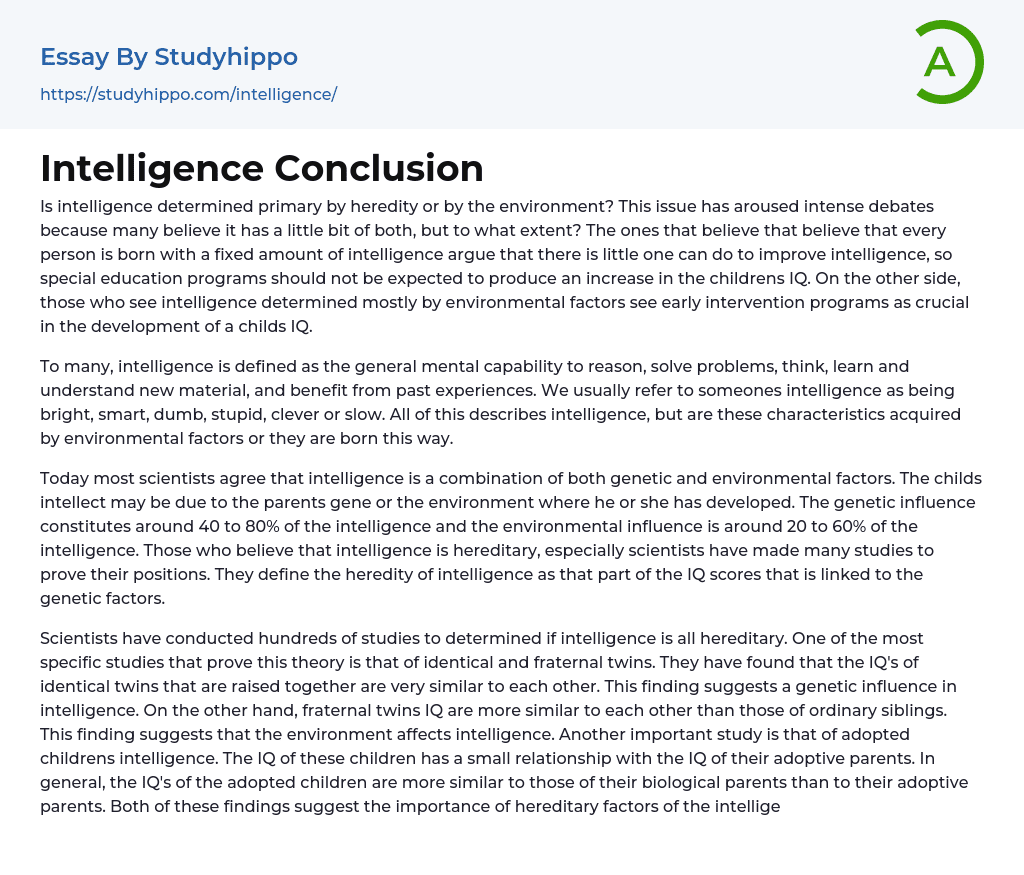Is intelligence determined primary by heredity or by the environment? This issue has aroused intense debates because many believe it has a little bit of both, but to what extent? The ones that believe that believe that every person is born with a fixed amount of intelligence argue that there is little one can do to improve intelligence, so special education programs should not be expected to produce an increase in the childrens IQ. On the other side, those who see intelligence determined mostly by environmental factors see early intervention programs as crucial in the development of a childs IQ.
To many, intelligence is defined as the general mental capability to reason, solve problems, think, learn and understand new material, and benefit from past experiences. We usually refer to someones intelligence as being bright, smart, dumb, stupid, clever or slow. A
...ll of this describes intelligence, but are these characteristics acquired by environmental factors or they are born this way.
Today most scientists agree that intelligence is a combination of both genetic and environmental factors. The childs intellect may be due to the parents gene or the environment where he or she has developed. The genetic influence constitutes around 40 to 80% of the intelligence and the environmental influence is around 20 to 60% of the intelligence. Those who believe that intelligence is hereditary, especially scientists have made many studies to prove their positions. They define the heredity of intelligence as that part of the IQ scores that is linked to the genetic factors.
Scientists have conducted hundreds of studies to determined if intelligence is all hereditary. One of the most specific studies that prove this theory is tha
of identical and fraternal twins. They have found that the IQ's of identical twins that are raised together are very similar to each other. This finding suggests a genetic influence in intelligence. On the other hand, fraternal twins IQ are more similar to each other than those of ordinary siblings. This finding suggests that the environment affects intelligence. Another important study is that of adopted childrens intelligence. The IQ of these children has a small relationship with the IQ of their adoptive parents. In general, the IQ's of the adopted children are more similar to those of their biological parents than to their adoptive parents. Both of these findings suggest the importance of hereditary factors of the intelligence.
Contrary to the studies that prove that heredity has a great influence on intelligence many experts believe that improved environments can increase a persons intelligence. Although it is known that environmental factors can be a great influence in intelligence it is not understood exactly how. Scientist have identifies a few specific environmental factors that may affect positively or negatively ones intelligence. For example: schooling economic level in society (poverty), family size, birth order, and prenatal care among others. All of these environmental factors have a great influence on intelligence proving that the environment does play an important part in the intelligence development.
There are numerous studies that prove that both genes and the environment affect directly or indirectly a childs intelligence. In my opinion everything in life is affected by heredity and especially environmental factors that we face each day. Is intelligence is almost 40 to 80% hereditary then there is no doubt that it plays an important role.
The other part is definitely affected by the environmental factors that surround you. No one is born without intelligence; there is just diversity in their capacities. It is up to every person to develop this potential to the most, always knowing that you can benefit from positive environmental factors. So agreeing with most scientists, intelligence is a mixture of nature vs. nurture.
- American Dream essays
- Barriers To Entry essays
- Capitalism essays
- Central Bank essays
- Compensation essays
- Consumerism essays
- Economic Development essays
- Economic Growth essays
- Economic Inequality essays
- Economic System essays
- Economy essays
- Employment essays
- Export essays
- Finance essays
- Free Trade essays
- Gross Domestic Product essays
- Human Development essays
- Income Inequality essays
- Industry essays
- Inflation essays
- International Business essays
- International Trade essays
- Macroeconomics essays
- Materialism essays
- Max Weber essays
- Microeconomics essays
- Minimum Wage essays
- Monetary Policy essays
- Monopoly essays
- Pricing essays
- Profit essays
- Recession essays
- resources essays
- Taxation essays
- Trade essays
- Unemployment essays
- Warehouse essays
- World economy essays
- Consciousness essays
- Intelligence essays
- Mindset essays
- Perception essays
- Problem Solving essays
- Resilience essays
- Addiction essays
- Anatomy and Physiology essays
- Biodegradation essays
- Cancer essays
- Dental Care essays
- Disability essays




